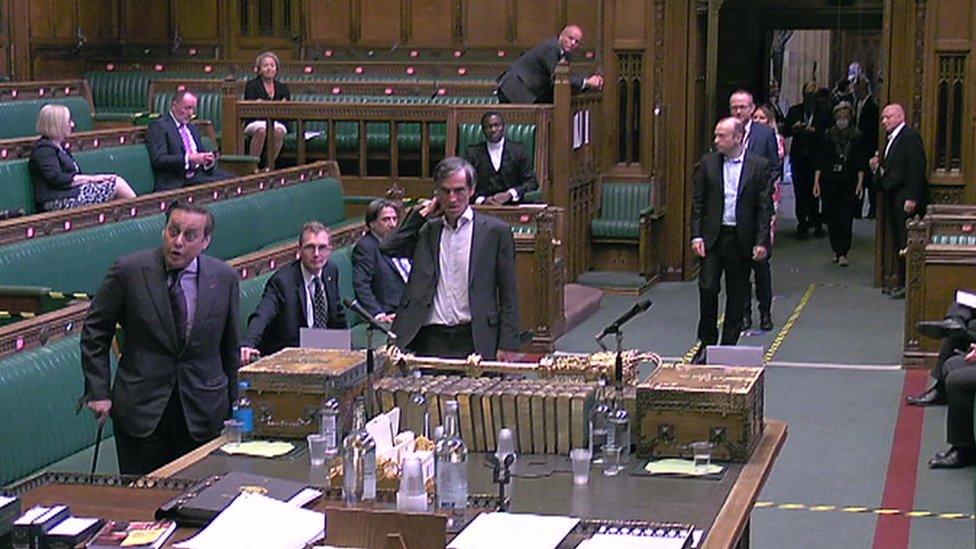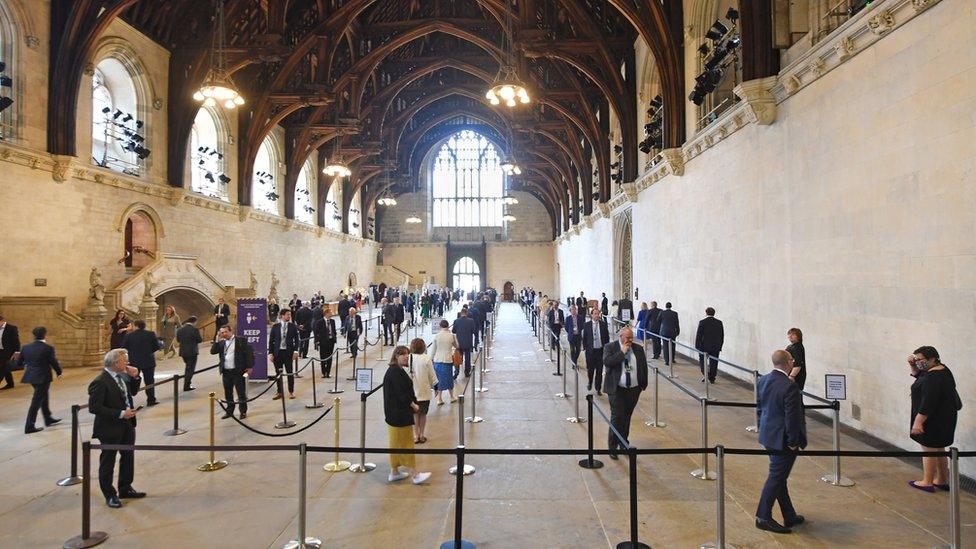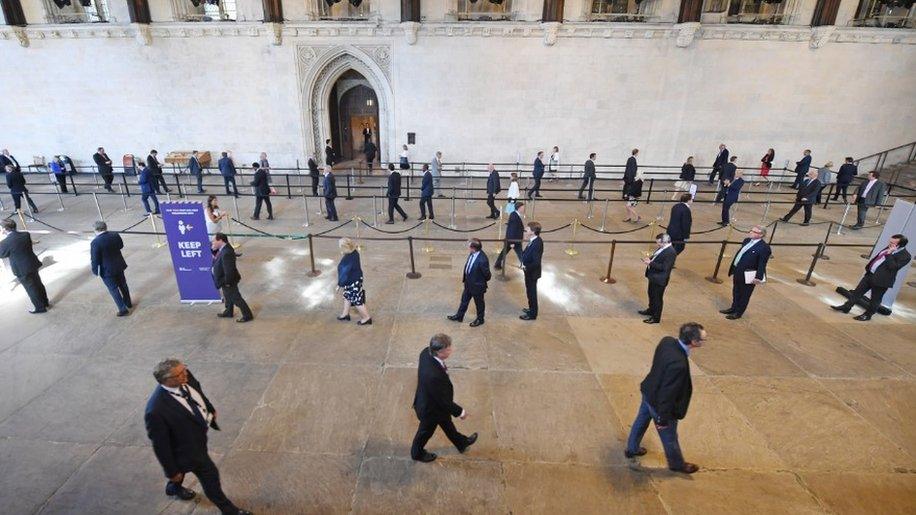Boris Johnson could regret virtual Parliament victory
- Published

MPs lining up to vote
This is what a working majority feels like.
The government's emphatic defeat of moves to bring back online voting for MPs unable to attend Westminster during the pandemic shows that it can comfortably see off the kind of rebellion that plagued Theresa May, and always threatened David Cameron (in his post-coalition mini-majority phase).
Pleasure at the victory shone through the professional impassivity of the Chief Whip, Mark Spencer, as he cast the final vote in yesterday's division.
This government will not be haunted by its rebels, and will enjoy the kind of room for manoeuvre that was never gifted to Boris Johnson's two predecessors.
But could it still prove to be one of those victories that the victor comes to regret.
The upshot of yesterday's vote is that the Commons will decide issues through the "Mogg Conga" - the pungent phrase coined by Labour whip Chris Ellmore, for the long queue of MPs which will snake out of the chamber, through Central Lobby, round into a coil in Westminster Hall, and then (via subway) into the parliamentary office block, Portcullis House.
Under this method, each vote will take around 40 minutes to complete, which meant that the three votes held on Tuesday 2 June absorbed two hours of MPs' time, provoking much grumbling, including on Twitter.
Three votes in a single Commons day is hardly unusual, and there can be many more.
On the two days in January when MPs went through the Committee Stage consideration of the EU Withdrawal Agreement Bill, there were votes on ten amendments - which would imply getting on for seven hours of voting under the current system. That is surely unsustainable.

The queue to vote in the House of Commons stretched into Westminster Hall
For the last few weeks the Commons has avoided votes as much as it can; that can't go on much longer.
A vote on abortion in Northern Ireland looms, the detailed consideration of the Immigration Bill is sure to involve large numbers of amendments, and their proposers will frequently push them to a vote.
We could see MPs wilting in hot weather, drenched in wet weather and furious at spending unproductive hours in a socially-distanced queue.
One of the arguments made in favour of the pre-COVID system of voting through the division lobbies is that it gave MPs a chance to tackle ministers about issues of concern, as they all queued to vote.
That does not apply here; under the new system the chance of quick useful conversations is minimal.
'Weaponised'
Worst of all, for ministers, this is a procedure that could be weaponised.
If Labour, or even one of the smaller opposition parties, took it into their heads to bring the Commons to a halt, all they would have to do is force regular votes.
This was pointed out by former Chancellor George Osborne, recalling his days as a junior whip, when Tory awkward squaddies like David Davis and David Maclean did just that. (It's worth remembering that the greatest disruption campaign in Commons history was run by Charles Stewart Parnell and his Irish Party, in the 1880s - and Parnell is a great hero of many SNP MPs…..)
Then there's the issue of MPs who can't attend for health reasons.
At PMQs today, Boris Johnson offered them the prospect of using the proxy voting system already in place for MPs on parental leave, which goes further than the concession made by his Leader of the House, Jacob Rees Mogg, to allow them to participate in question times and statements by video link.
There is a lot of sympathy for MPs, like the Education Committee Chair Robert Halfon, who can only participate in full in the work of the Commons, at the risk of their health.
'Pale shadow'
To be sure, the virtual Commons is a pale shadow of normal parliamentary working.
The debates are stilted and ministers get a much easier ride, the sudden tides and surges in parliamentary opinion which can wrong-foot a government are softened and baffled by Zoom.
But for a lot of MPs, and their constituents, it's the only option available. Which is why MPs can expect to return to the issue pretty soon.
Mr Rees-Mogg has a motion down to allow limited virtual participation for those MPs, and the Opposition parties have responded with amendments to allow full participation and remote voting, so another debate is coming soon.
And a crisis focused government will be spending more political capital on a procedural issue.
- Published3 June 2020

- Published2 June 2020
